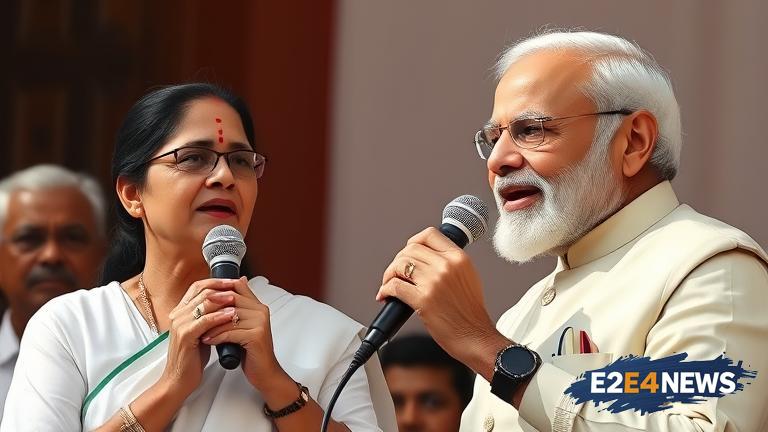In a recent development, West Bengal Chief Minister Mamata Banerjee has expressed her disappointment and outrage over Prime Minister Narendra Modi’s comments, where he allegedly referred to her and her party members as ‘thieves’. Banerjee stated that she never expected the Prime Minister to use such language, especially considering their respective positions. She emphasized the importance of maintaining dignity and respect in political discourse, regardless of differences in opinion. The Chief Minister asserted that she has always shown respect to the Prime Minister’s chair, and it is only fair that he reciprocates the same. Banerjee’s reaction comes after PM Modi’s speech in West Bengal, where he criticized the state government’s handling of various issues. The Prime Minister’s comments have sparked a heated debate, with many politicians and citizens weighing in on the matter. Banerjee’s party, the Trinamool Congress, has been at odds with the Bharatiya Janata Party (BJP) for some time now, and this latest incident has further strained their relationship. The Chief Minister’s response has been seen as a strong statement, asserting her commitment to upholding the dignity of her office. She also highlighted the need for politicians to engage in constructive dialogue, rather than resorting to personal attacks. The incident has raised questions about the state of politics in India, with many calling for greater civility and respect in public discourse. Banerjee’s comments have been supported by many of her party members, who have condemned the Prime Minister’s language as unacceptable. The BJP, on the other hand, has defended PM Modi’s comments, stating that they were made in the context of the state government’s alleged corruption. The controversy has sparked a wider debate about the role of language in politics, with many arguing that politicians should be held to a higher standard of discourse. As the situation continues to unfold, it remains to be seen how the relationship between the Centre and the West Bengal government will evolve. The incident has also highlighted the challenges of coalition politics in India, where different parties often have competing interests and ideologies. Despite these challenges, many are calling for greater cooperation and dialogue between politicians, in the interest of the nation. The controversy has also sparked a discussion about the media’s role in reporting on politics, with some arguing that sensationalized coverage can exacerbate tensions. In conclusion, the incident has highlighted the need for greater respect and civility in Indian politics, and has sparked a wider debate about the state of public discourse in the country. The relationship between the Centre and the West Bengal government will be closely watched in the coming days, as the situation continues to unfold. The incident has also underscored the importance of constructive dialogue and cooperation between politicians, in the interest of the nation. Furthermore, the controversy has raised questions about the impact of political rhetoric on the broader population, and the need for politicians to be mindful of their language and tone. Additionally, the incident has highlighted the challenges of navigating complex political relationships, and the need for greater empathy and understanding between different parties and ideologies. Ultimately, the incident has sparked a timely debate about the state of Indian politics, and the need for greater respect, civility, and cooperation in public discourse.
